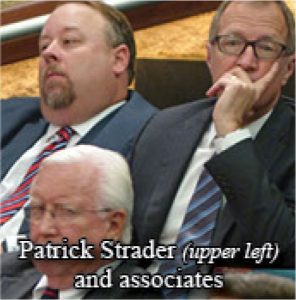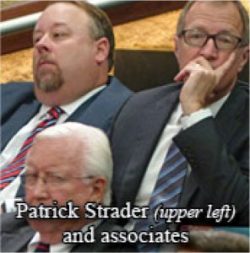

In 1968, the California Public Records Act was passed by the State Legislature and signed by the Governor, requiring the disclosure of governmental records to the public upon request, unless otherwise exempted by the law. Under this policy and the California Constitution, Californians have the right to access public information maintained by local and state government agencies, including the Department of Justice. Within this Act, public records are broadly defined to include “any writing containing information relating to the conduct of a public’s business prepared, owned, used or retained by any state or local agency regardless of physical form or characteristic.” Based on this broad, inclusive definition, any written record pertaining to public business that is to be considered and potentially voted upon by an elected official would be covered by this definition. There is quite a lot of information that can be discovered via a public records request; once the request is made and determined by the public agency to qualify under the California Public Records Act, the request must be responded to and the information provided.
To reinforce the right of the public to information that impacts the decision making process of a public agency, the California voters approved Proposition 59 on November 2, 2004. Commonly known as the Sunshine Amendment, this amendment to the California Constitution read in part that “the people have the right of access to information concerning the conduct of the people’s business, and, therefore, the meetings of public bodies and the writings of public officials and agencies shall be open to public scrutiny.”
So if you want information on how any governmental body operates in the state of California you have the right to request it under the CPRA. This includes everything from budgets, contracts and bidding processes to the salaries of government employees and communications to public officials pertaining to a matter before the agency.
As for the rules of the road when it comes to the term “Off the Record,” a term I have had to explain to too many electeds in Orange County over the years,“off the record” clearly means “I’m telling you something on the condition that you will not attribute the information to me and/ or you will not publish it.
According to Mashable, ‘off the record’ does what it says …
In an off-the-record situation, the pen goes down. The notebook is closed. Typing ceases. Audio recording devices and apps are turned off. The journalist isn’t even supposed to write the conversation down later. They’re left without anything to refer to, and the understanding is that she or he will not only not quote you, but not even paraphrase what you’re saying. There will be no record, and no mention of this information anywhere.
… but it has to be an agreement.
As much as you would like to simply declare something off the record after it comes out of your mouth, you can’t. We heard it, and we’re within our rights to report it.
The kicker here is a journalist must agree to going off the record. Stating loudly in a text message or email OFF THE RECORD followed by a lengthy diatribe not agreed to by the journalist means the content of those emails or text messages is ON THE RECORD.
Which brings me to my point.
We recently published a post on how Irvine Councilmember Christina Shea places the needs of developers ahead of Irvine taxpayers and provided emails with date/time stamps to show it took her just minutes to relay details of a proposed slow growth initiative to contacts at the Irvine Company and to Patrick Strader, who is affiliated with development company, FivePoint Communities. Those e-mails were acquired through a public records request.
Recently, through another public records request, the City of Irvine provided a voice mail left by Patrick Strader on the cell phone of Councilmember Lynn Schott. The voicemail accused Schott of unfairness towards FivePoint because she voted against their “land swap” proposal for the Veteran’s Cemetery — an action which would move the cemetery from the Great Park to a piece of land adjacent to the freeway. After offering to sit down with Schott to “improve their work relationship” he implied, through a veiled threat, that if she did not come around to see things the developers way, “it’ll be a long two years.” I found it a remarkable lack of disrespect toward a city official and certainly made it sound like he thought Schott should do the developer’s bidding rather than doing what was best for the community.
I contacted Patrick Strader via text message to advise him that I had received a copy of the voice mail in response to my Public Records Request and asked if he wished to comment.
Strader’s first line was “OFF THE RECORD” followed by a lengthy response. Let’s go back to lesson one. Schott is a city council member; communications with her, other city council members, city staff and constituents discussing city business are a public record.
Strader, who is a lawyer and has extensive experience working with public agencies and the media surely understood that for the condition that his communication be “off the record” to occur, I would have to agree prior to any information being shared. I did not. Mr. Strader and I have had off the record discussions in the past, but each conversation requires a new agreement by both parties. I did not agree. There’s no such thing as a blanket off the record agreement that lives on indefinitely.
Strader then went on to threaten legal action should I publish the reproduction of his voice mail. The threat of a lawsuit is far more damning than the actual voicemail. More troubling is that it reveals just how much this representative of FivePoint Communities wants to keep the public from knowing how he operates.
Strader maintains he owns the copyright to the voice mail; I would assert that he’s certainly the creator of the content but he no longer controls it. Furthermore, the California Supreme Court has ruled officials or city employees cannot bypass public records by leaving messages (text or voice) or emails on a subject’s personal phone.
Terry Francke from Cal Aware, an expect on public records, reviewed the voice mail sent by the city of Irvine, and messages from Strader, and concluded:
“Dan, in 37 years of following media and intellectual property law I’ve never seen any cases or other authority suggesting that one has a copyright or any other IP protected interest in the messages one leaves in voicemail to a government official. If this individual could cite any he would have.”
Terry Francke, General Counsel.
From the LA Times:
The court said that communications sent on personal cell phones and computers must be disclosed to the public if they “relate in some substantive way to the conduct of the public’s business.”
“A city employee’s communications related to the conduct of public business do not cease to be public records just because they were sent or received using a personal account,” Justice Carol A. Corrigan wrote for the court.
…
David Snyder, executive director of the First Amendment Coalition, said the decision closed what had become a loophole in the public records act.
“If employees are conducting written business about the people’s business on email, that ought to be available to the public,” said Snyder, whose group promotes free speech and government transparency. “It shouldn’t matter if the email is privately owned or owned by the government.”
While I may choose to post the voicemail in the future, I would encourage Irvine residents to contact the Public Information Office for the City of Irvine and place your own Public Information Request asking for a copy of any voice mail left by Patrick Strader to Irvine Council member Lynn Schott from December 1, 2016 through today. Ask for it in downloadable audio file so you can hear it yourself. The city has 10 days to respond.
Strader has threatened me as well, asserting that he’d use all legal remedies to protect his privacy and “copyright.” He argues the First Amendment doesn’t protect me and promised me an expensive lesson should I publish his voice mail or a transcript of said voice mail.
Watching FivePoint pursue a global takeover of the City of Irvine is hard. I live here. What’s harder is watching Mayor Wagner and Councilmembers Shea and Fox do their bidding. If Strader needs to sue someone, it’s the city of Irvine for giving me the public record. Good luck with that. If he wants to sue me, good luck defending this in the court of public opinion. Hell, good luck defending his in a court of law.
Thank you Councilmember Schott for putting the public interest first. We may disagree on many things, but you are not for sale, and I admire that.

Lawyers ……..
They will throw any old shit out there to intimidate – phuck ’em.
The swamp of Irvine needs to be drained of this kind of bully. He is an embarrassment to our city.
One of my lawyers tells me he has nothing; I have emails into a few other journalism think tanks and suspect they are going to laugh at him.
But he certainly can still sue me and any defense I have will mandate payment of legal fees by him. It’s a public record released by the city. If media outlets were sued for releasing public records, newspapers would be out of business. His intention is to cost me money. That’s cowardly.
“I found it a remarkable lack of disrespect toward a city official … ”
Not sure which I like more: the idea that this is a typo or that it’s a Freudian slip.
Andrew, the gist of the message is “you work for us” and “you need to vote yes on things we want”
We need to bring this cemetery site swap to a vote of the city residents.